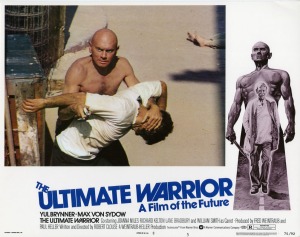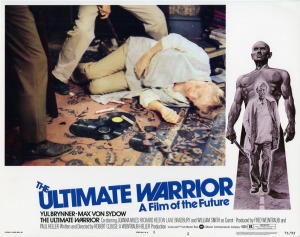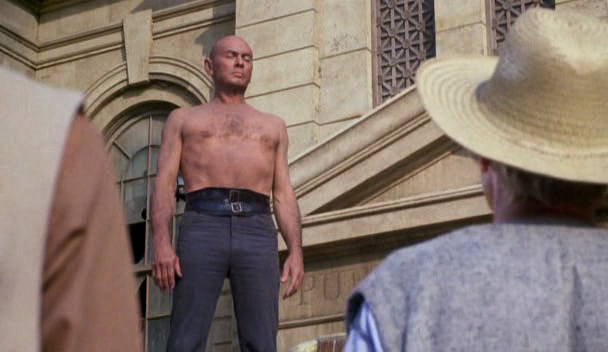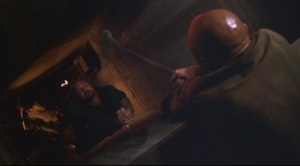Director: Robert Clouse. Producers: Fred Weintraub & Paul Heller. Writers: Robert Clouse & Fred Weintraub. Starring: Yul Brynner (Carson), Max von Sydow (Baron), William Smith (Carrott), Joanna Miles (Belinda), Richard Kelton (Cal). Music: Gil Mellé. Cinematography: Gerald Hirschfeld. Editor: Michael Kahn. Warner Bros, 1975 (94 mins).
A Film of the Future
The Ultimate Warrior (1975) is a post-apocalyptic Kung Fu movie directed by Robert Clouse and starring Yul Brynner and Max von Sydow. It was part of a cycle of violent post-apocalyptic movies made in the ’70s which included The Ωmega Man (1971), A Boy and His Dog (1974) and Damnation Alley (1977). It is a predecessor to George Miller‘s Mad Max (1979) and its sequels (and numerous rip-offs) and, most obviously, John Carpenter‘s Escape to New York (1981).
The Ultimate Warrior is set in the New York of the then-near future of 2012 (the normally reliable Encyclopedia of Science Fiction has it incorrectly dated 2022) after the fall of the West due to fuel shortages, crop failures and pandemics. New York is now inhabited by scattered communities living on the scraps of civilisation. One of these communities is lead by Baron (Von Sydow) who has maintained some degree of civilization.
Brynner plays Carson, a samurai-like warrior for hire who advertises his services by standing motionless, half-naked, meditating atop an overturned bus. He is approached by a delegation lead by Baron who needs muscle in his struggle with a more barbaric gang lead by Carrot (William Smith).
Brynner was a Russian-born star most famous for playing Mongkut, the eponymous King of Siam, in the Rodgers and Hammerstein musical The King and I (1956), and Chris Adams in John Sturges‘ The Magnificent Seven (1960). He had already starred in one successful sf action movie, Michael Crichton‘s Westworld (1973), in which he played a silent gun-slinging android; here his character is almost as taciturn.
At first Carson seems to ignore Baron’s advances until Baron’s party are attacked by Carrot’s men while returning home, when Carson comes to the rescue. This is the first of several action sequences in the movie. The film is directed by Robert Clouse and produced by Fred Weintraub and Paul Heller, the team behind the Bruce Lee‘s English language breakthrough movie Enter the Dragon (1973). Clouse would later direct the Blaxploitation action movie Black Belt Jones (1974) starring Lee’s Enter the Dragon co-star Jim Kelly, Jackie Chan‘s The Big Brawl (1980) and Cynthia Rothrock‘ China O’Brien (1988) – though, in truth, he generally lacked the skill to generate much excitement from his action scenes.
Rather shockingly to contemporary audiences, Carson is a knife-fighter rather than a martial artist as such, and not averse to stabbing his opponents in the back. Stabbing gets a bit of a bad press these days thanks to some people taking it too far but back in the ’70s everyone was at it (see Leela in Doctor Who). The result is that the violence lacks the balletic grace of the more authentic Kung Fu movies but feels more brutal. Interestingly, in Bill S. Ballinger‘s novelization, based on an earlier draft of the script, Carson acquires the knife rather later in the story: he rescues Baron’s party using proper martial arts.
Back in Baron’s stockade we later learn that it was the offer of cigars which persuaded Carson to take the Baron’s side, rather than any sense of justice. Carson is a morally ambiguous figure and is, perhaps rightly, regarded with suspicion by the other members of the commune. Carson tells Baron that he is just passing through New York on the way to an island off the coast of North Carolina where he hopes to find his sister. Baron, suspecting that his own community has little chance of survival, asks Carson to take his pregnant daughter Melinda (Joanna Miles) with him, together with her husband Cal (Richard Kelton) who has developed a strain of disease-resistant seeds with which he hopes to reintroduce agriculture.
William Smith was a familiar figure from 70s and 80s action movies like Clint Eastwood‘s Any Which Way You Can (1980), Conan the Barbarian (in which he played Conan’s father, 1982) and Francis Ford Coppola‘s Outsiders (1983) and Rumble Fish (also 1983), as well as TV shows like Buck Rogers in the 25th Century and The A-Team, before becoming the last ever Marlboro Man. More recently he played Dracula in The Erotic Rites of Countess Dracula (2001).
Cal is murdered by Carrot’s men in an ambush and Baron is killed when his own people turn on him. Carson and Melinda escape through the subway system pursued by Carrot’s men. Rather inconveniently Melinda goes into labour and Carson has to deliver the baby. Carson then remains behind to fight Carrot’s gang while Melinda makes her escape, with her baby and her husband’s seeds (I suspect the symbolism is deliberate).
The final duel between Carson and Carrot is genuinely exciting as they fight, locked together at the wrist, by chains. The conclusion is as cynical and brutal as only ’70s movies are, and leaves little space for a sequel though apparently the studio had hopes to continue the story.
The partly electronic soundtrack is by American painter, sculpter and jazz musician Gil Mellé, who also scored Robert Wise‘ The Andromeda Strain (1971) and Rod Serling‘s TV series Night Gallery.
The film was edited by Michael Kahn who would soon go on to edit Steven Spielberg‘s Close Encounters of the Third Kind (1977); his collaborations with the director continue to today. He has garnered seven Academy Award nominations for Best Film Editing, winning three for Spielberg’s Raiders of the Lost Ark (1981), Schindler’s List (1993), and Saving Private Ryan (1998), and has been nominated for six BAFTA awards, winning two, for Schindler’s List and Adrian Lyne‘s Fatal Attraction (1987).
The Ultimate Warrior was released on Region-free DVD in 2008, paired with Montgomery Tully‘s Battle Beneath the Earth (1967).
References:
-
Ballinger, Bill S., The Ultimate Warrior (Novelization, 1974)
-
Brosnan, John & Peter Nichols, ”The Ultimate Warrior” (1979) in The Encyclopedia of Science Fiction
-
Brosnan, John, The Primal Screen: A History of Science Fiction Film(1991)
-
Newman, Kim,Millennium Movies: End of the World Cinema (1999)











